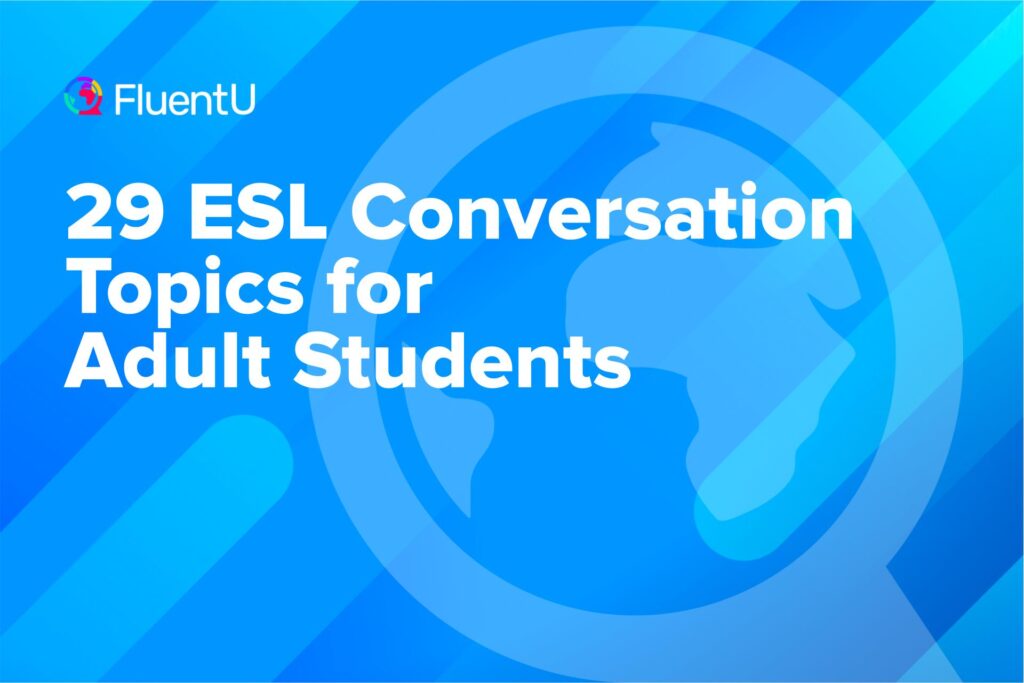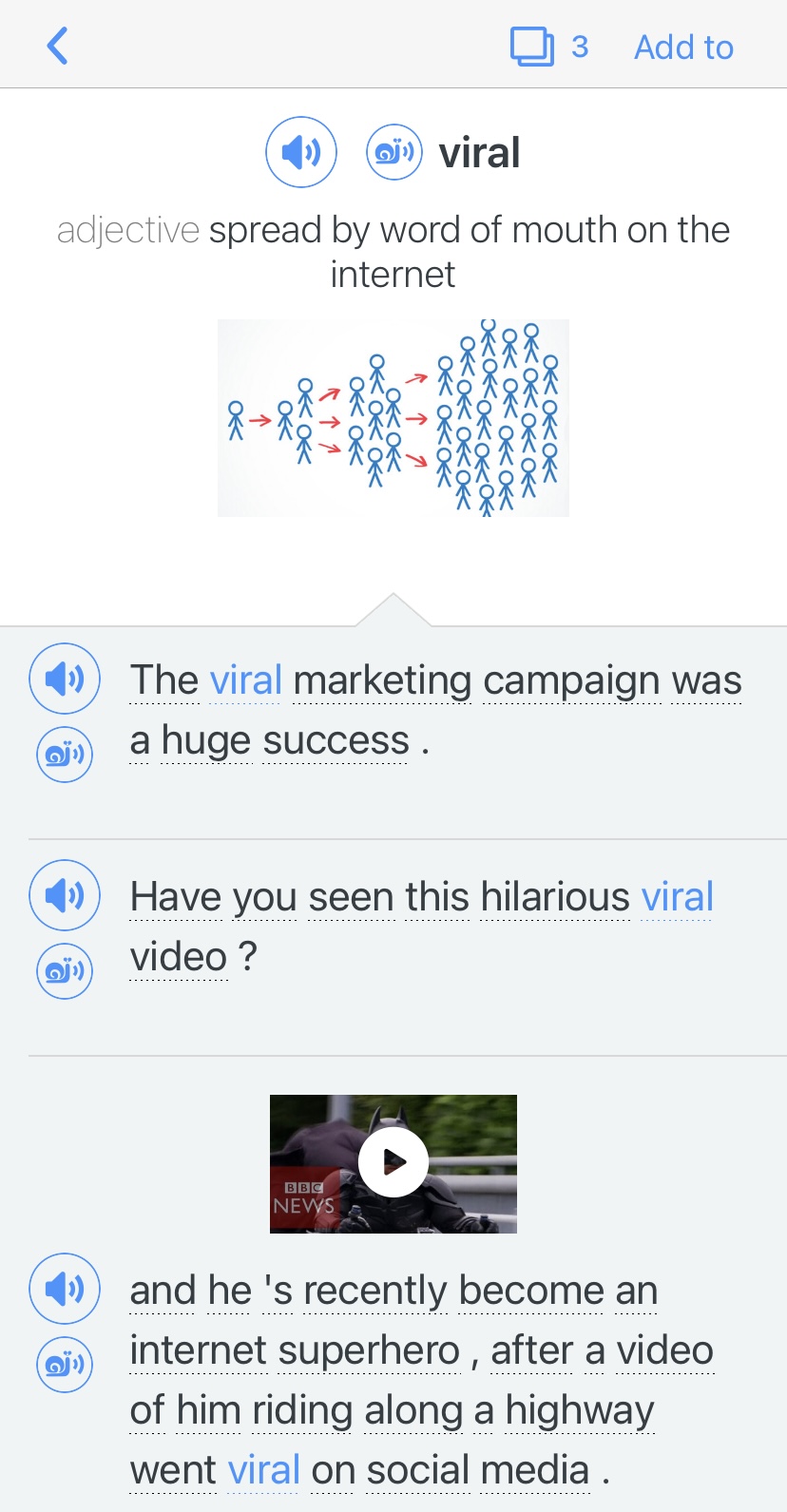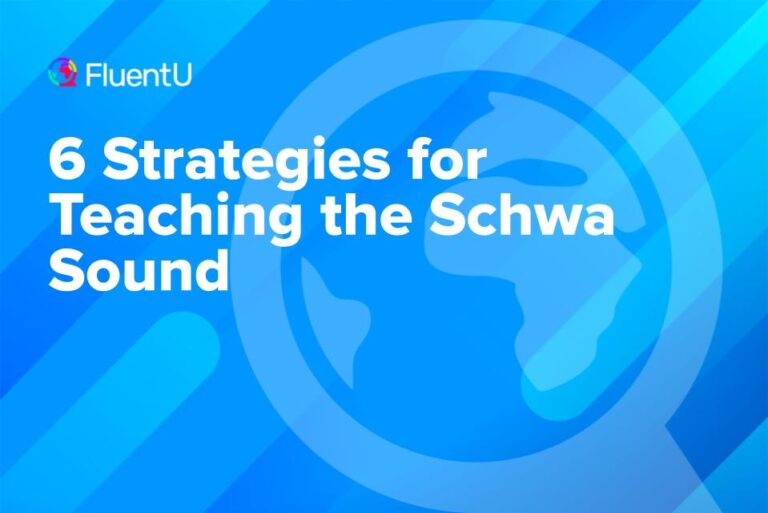Contents
- 1. Hobbies
- 2. Work
- 3. Food
- 4. Sports
- 5. Time
- 6. Sleep
- 7. Music
- 8. Television
- English Immersion from Your Device
- 9. Movies
- 10. Travel
- 11. First Dates
- 12. Risk
- 13. Motivation
- 14. Beauty
- 15. Crime
- 16. Love
- 17. Goals
- 18. Dreams
- 19. Restaurants
- 20. Cooking
- 21. Money
- 22. Shopping
- 23. Plans
- 24. Books
- 25. Life
- 26. Learning
- 27. Games
- 28. Computers
- 29. Problems
29 ESL Conversation Topics for Adult Students

One key goal almost every adult ESL student shares is gaining the ability to speak English with others. What better way to learn to speak English than to speak about the very same things that you speak about on a daily basis?
ESL speaking activities work even better when someone speaks about their own personal recollections, thoughts and ideas on these topics. Use the topics and questions below to get conversations started.
Download: This blog post is available as a convenient and portable PDF that you can take anywhere. Click here to get a copy. (Download)
1. Hobbies
Everybody has hobbies, and everybody loves talking about them. Hobbies could be passions too, you know. Some simple questions to ask include:
- What are your hobbies?
- Why do you like your hobbies so much?
- How often do you do these hobbies?
- How long have you been doing these hobbies, and how did you get started?
- What hobbies did you used to have, but now do not?
- Is it important to have hobbies? Why/why not?
2. Work
Lots of people work and have lots to say about it. I mean, if you’re spending about a third of your waking hours at work, you may have lots to say.
Some good questions are:
- What work do/did you do?
- Do/did like your job? Why or why not?
- What is your dream job?
- What work is common in your city/area/country?
- What is your general view about work? Why?
3. Food
Food is possibly the most universal topic of them all and everyone loves to discuss what they eat. Food-themed ESL activities are always a hit with students.
This is also an ideal topic for beginners because the vocabulary is usually pretty simple. You could use questions like:
- What is your favorite food? Why?
- What food do you eat a lot?
- What food comes from your country?
- How do you feel when you eat food?
- What foods do you dislike? Why?
- Where do you usually get food from?
4. Sports
This is a topic that many people get very excited about. If someone is passionate or emotional about a topic, they can be more motivated to speak and understand things related to it.
A few good example questions are:
- Do you like sports? Why/why not?
- How often do you exercise/play sports?
- Did you play any sports as a child?
- What sport/physical activity is popular in your country?
- What is your opinion on professional sports?
5. Time
As people get older, their perceived value of time increases, so it’s a practical topic that everyone has something to say about.
You could ask questions like:
- How much free time do you usually have?
- How important is time to you?
- If you had more free time, what would you do?
- “Time is money.” Do you agree or disagree? Why?
- How do you feel about time that is wasted?
6. Sleep
As people get older, they start to appreciate a good night’s sleep more and more. This topic is often a favorite.
Some example questions are:
- How much sleep do you usually get?
- Why do some people sleep well while other people do not sleep well?
- What do you do when you have trouble sleeping?
- What time do you usually go to sleep? What time do you usually get up?
- Have you ever slept in a strange place that was not a bed?
7. Music
Everybody loves music and most people feel very strong emotions toward it—especially when it comes to the music that they love (or hate) most. Some simple questions to ask could be:
- What types of music do you like/dislike?
- How do certain kinds of music make you feel?
- What types of music come from your country?
- What’s your favorite song/album/artist?
- What music is popular in your country right now?
Listening to music with English lyrics can be fun and engaging activity that can also start conversations.
Watching music videos with subtitles will help students remember the vocabulary they hear in a song.
8. Television
Television is one of those topics that everyone has an opinion about.
TV will enable you to showcase native English forms and provide some great context before diving into discussion questions. Good questions include:
- How often do you watch TV?
- Should everyone have a television in their home?
- What is the best way to watch television: On a television set, computer, tablet or phone?
- What television programs are popular in your country?
- What do you think will be the future of television?
- What is your opinion on television?
- If you had your own TV show, what would it be like?
If your students enjoy learning from TV and other native content, you can try a media-focused resource like FluentU, available both for schools and individual learners.
English Immersion from Your Device
I get it–learning English isn’t always a walk in the park. But it doesn’t have to be a boring, tedious, or hair-pulling experience either. In fact, making it fun is key to your success!
With FluentU, you can learn English naturally by turning any YouTube or Netflix video with subtitles into an interactive language lesson. I’m talking about language immersion from the convenience of your device.
Plus, you can import your favorite YouTube videos into your FluentU account to learn from them using the app or website. Or browse our curated library of videos handpicked for beginners and intermediate learners.
While you watch a video, FluentU’s interactive subtitles let you tap on any word for an instant definition, example sentences, images, and audio. No more pausing and searching for translations—everything you need is right there!
It's all built to help you learn how to use words in real contexts. For example, if I tap on the word "viral," this is what pops up:
Learn even faster with built-in quizzes that reinforce vocab from every video. FluentU tracks your progress, gives you extra practice with tricky words, and reminds you when it’s time to review—so your learning is always personalized and effective.
Try FluentU today on your computer or tablet, or download our app from the App Store or Google Play. Click here to take advantage of our current sale! (Expires at the end of this month.)
9. Movies
Like television, movies are a popular conversation topic. I mean, who doesn’t watch movies? A few good questions to be asked could be:
- What was the last movie you saw? How was it?
- What is your favorite movie? Why?
- How are the movies in your country? What are the best ones?
- How often do you watch movies in English?
- If there were a movie about your life, what kind of movie would it be? Why?
10. Travel
Travel can be a great discussion topic – it encourages storytelling in the past tense and inspires students to talk about culture and similar topics.
Here are some possible questions:
- Where have you traveled?
- What countries have you been to?
- Where would you like to travel to in the future?
- When you travel, what safety precautions do you take?
- Do you like to prepare a lot before you travel, or just wing it?
- What are some cultural issues that you have experienced while traveling? Do you have any funny or embarrassing stories?
11. First Dates
Talking about first dates gets everybody interested. We’ve all been there.
You could ask questions like:
- How many first dates have you had?
- How do you feel about first dates?
- What is a common first date like in your country?
- What is the best/worst first date experience you’ve ever had?
- What makes a good first date in your opinion?
12. Risk
Everyone feels a certain way about risk. Some are risk-oriented, others are risk-averse. Talking about risks seems to generate some good conversation. You could ask questions like:
- What is your definition of risk?
- Are you a risk taker? Why/why not?
- What are the advantages/disadvantages of taking risks?
- What risks do you come across in your work/life?
- What risks have you taken in your life?
13. Motivation
Whether or not the students are a motivated bunch, motivation is a good topic to discuss in order to inspire your students.
Some example questions are:
- How motivated are you in general?
- What motivates you to do things?
- What is the best motivator to succeed?
- What do you do when you feel unmotivated?
- What is a good way to motivate others?
14. Beauty
Anyone can appreciate beauty in all its forms, and anyone can recognize the importance of the concept of beauty in our cultures, societies and behaviors.
This makes it a good topic to discuss to get some opinions and various views within a group.
You could ask questions like:
- What is “beauty”?
- What/who do you consider beautiful?
- What does “inner beauty” mean to you?
- Do you consider artificial beauty (cosmetic surgery) to still be beauty? Why/why not?
- How do you feel about the emphasis that people put on beauty these days?
- What would you tell your children about beauty?
15. Crime
Crime may not be on the top of people’s lists of favorite topics but it’s something that’s talked about.
Depending on someone’s life experiences, it may be something that has affected their lives. Learning to discuss it could help in the long run.
Good discussion questions are:
- Is crime a big problem in your city/country?
- Have you ever been a victim of crime?
- What crime is common in your city/country?
- What would you do if you noticed a crime being committed?
- How is the law enforcement in your city/country?
16. Love
Most people have had some firsthand experience with love that they’d like to talk about. It’s another one of those universal topics that gets the conversation going.
Even if it’s not about romantic love and heartbreak, students can talk about familial love with their parents and children, as well as love between friends.
Questions like these are good:
- What is love?
- Who/what do you love?
- What good/bad experiences have you had with love?
- Can you be too young to be in love? Why/why not?
- How do you feel about love?
17. Goals
We all have goals and talking about them actually gets us more encouraged to do something about them. Sharing goals is also a good way to help get them achieved.
A good set of questions is:
- What are your current goals in life?
- How do you plan to reach your goals?
- How often do you set goals for yourself?
- What goals have you set and achieved in the past?
- How do you feel when you reach your goals?
18. Dreams
We all have dreams, sometimes on a nightly basis, and they can make for a great discussion topic as it inspires students to be creative and even whimsical.
Great questions for this topic include:
- What kinds of dreams do you have?
- What do you think dreams mean?
- How much of your dreams do you remember? Why?
- What is your opinion on premonitions? Are they real?
- What are examples of memorable dreams you have had?
19. Restaurants
Along with eating, people love talking about their favorite eateries and restaurants. Some students might even relate to each other with their choices and views.
Good questions include:
- How often do you go to restaurants?
- What is your favorite restaurant? Why?
- What do you usually order at a restaurant?
- What is the restaurant experience like in your country?
- Have you ever worked in a restaurant?
- If you owned a restaurant, what kinds of food would you serve?
20. Cooking
Cooking is another topic that may allow for some good conversation. Most people in most countries do a good amount of cooking.
A few good questions could be:
- In your home, who usually cooks?
- How often do you cook?
- How well do you cook? What can you cook well?
- What are the advantages/disadvantages of cooking?
- What food would you like to learn how to cook?
Recipes can be a fun way to introduce students to assorted cooking vocabulary and phrases. And in addition to written recipes, there are tons of recipe videos on the web if you want to work on listening comprehension as well.
21. Money
If there is one topic that affects everyone, it has to be money. People love talking about money.
Well, they may not if they’re broke—but even then it’s a relatable topic that gets conversations going.
Great questions include:
- How well do you manage your money?
- Why do some people have money problems?
- What are some good ways to make money?
- What would you do if I gave you $20/$2,000/$2,000,000?
- How often do you save money? Why?
22. Shopping
This one is a personal favorite for many. Shopping just brings out the zest in some people.
Others feel strongly the other way—very few people are completely neutral on this topic.
A few good questions are:
- Do you enjoy shopping? Why/why not?
- What is your favorite shop? Why?
- In your city, where is a good place to go shopping?
- How do you feel about online shopping?
- What do you think shopping will be like in the future?
23. Plans
Everybody makes plans and discussing them could even influence the class to start making plans of their own! A few example questions include:
- How often do you plan things? Why?
- What are your plans for (________)?
- What are your plans for your English?
- What do you think of this quote? “Having no plan is a plan to fail.”
- Do you have any back-up plans?
24. Books
Books make for a good conversation topic because most people enjoy a good book.
When you read, your mind is filled with new images, feelings, ideas and thoughts. It can be immensely satisfying for someone to share how they feel about reading.
Some questions to ask are:
- Do you like books/reading? Why/why not?
- What kind of books do/did you like?
- What is your favorite book? Why?
- What was the last book you read?
- Do you believe reading books/literature is more important than reading stuff online? Why/why not?
25. Life
Life discussions go on in all languages and English is no exception.
Life is a good topic since everyone has their own views and thoughts on this universal subject.
You could bring up questions like:
- What is the meaning of life?
- How is your life going up to this point?
- What do you think happens after death?
- What important life lessons have you learned?
- If tomorrow was your last day to live, what would you do?
26. Learning
Learning is like nature—it’s all around us, even on a subconscious level. Our brains are built to absorb, filter and store information.
A conversation about learning could actually stimulate some English learning!
A few questions that are suitable are:
- How important is learning? Why?
- Besides English, what are you currently learning?
- What things are you good/bad at learning? Why?
- What would you most like to learn?
- What is the most difficult part of learning? Why?
27. Games
Games are fun and everybody enjoys fun, no?
But in all seriousness, talking about games tends to gear the conversation more toward past tense, which can bring students a fond sense of nostalgia.
Some simple questions could be:
- What is your favorite game ever?
- What games did you play as a kid?
- What games are popular/came from your country?
- How competitive are you when it comes to games?
- What games do you still play now? Why?
28. Computers
It’s hard to go a day without talking about computers. This universal topic could have students discussing quite a few things, much of which could relate to real life too!
Great questions on this could be:
- Describe your computer at home/work.
- What do you usually use a computer for?
- Do you like computers? Why/why not?
- What was the first computer you ever had like?
- What do you think will be the future of computers?
29. Problems
Even though nobody likes to talk about problems per se, everybody still talks about their problems to other people!
Problems are actually a good topic for discussion since they could help others relate to each other and even present solutions too.
A few fine examples of questions are:
- How do you deal with your problems?
- What problems do you come across in your work or life?
- Do you feel that problems are opportunities? Why or why not?
- What was the last problem you solved and how did you do it?
- “Problems don’t matter. Solutions do.” Do you agree or disagree?
Discussion questions like the ones above—questions about everyday things—work well because they really get the brain thinking.
These topics relate directly to students on a familiar level and can even spark some fascinating discussions.
You could even mix up the example questions any way you’d like.
These topics may even inspire you to come up with some of your own, as you begin to understand what works and what doesn’t.
Happy discussing!
For more tips, check out this post next:
How to Teach English to Adults: 10 Engaging Activities
Teaching English to adults is not the same as teaching children or teenagers. There are some important differences you must consider, such as their reasons for learning…
Download: This blog post is available as a convenient and portable PDF that you can take anywhere. Click here to get a copy. (Download)













